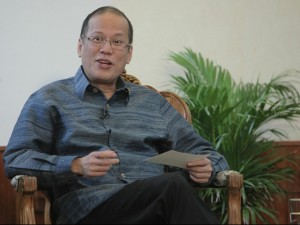
Philippine President Benigno S. Aquino III answers questions directed to him during the Coffee Meeting with the Philippine Media at the Don Chan Palace at the sidelines of the 9th Asia-Europe Meeting (ASEM9) on Monday night (November 05, 2012). Robert Viñas / Malacañang Photo Bureau
VIENTIANE, Laos—The bill providing compensation to victims of human rights violations under the martial law rule of Ferdinand Marcos is not just about money, but acknowledgement by the state of its lapses in protecting the people, President Benigno Aquino III said here Monday.
Aquino said he would talk to Senate justice committee chairman Francis Escudero about the passage of the measure, after he promised Swiss President Eveline Widmer-Schlumpf that he would fast-track the completion of the compensation process.
The two leaders met Monday on the sidelines of the 9th Asia Europe Meeting Summit, which is ending Tuesday.
The House of Representatives passed the bill earlier this year, but the measure has yet to gain traction in the Senate.
The President said he was just waiting for the proper timing to discuss the measure with Escudero, whose father, the late Sorsogon Representative Salvador Escudero, was agriculture minister under the late dictator Ferdinand Marcos.
The compensation bill states that the compensation for the victims would be sourced from the ill-gotten wealth of the Marcoses found in Swiss banks. Swiss authorities earlier transferred $540 million in ill-gotten Marcos deposits to the Philippines.
The compensation bill has to be passed before the money could be released to the victims.
The chief executive said the issue about the compensation measure was personal to him.
“This is personal not in the sense of the monetary aspect. We need to be clear in our history books that we had a period like that, when the government put up by the people was used to curtail their rights,” Mr. Aquino told reporters here.
He added there must be a formal record of horrific events so that the Philippines would not repeat its history.
“There must be a formality for future generations that we had an aberrant period, that there was a nightmare that happened to the Filipino nation, without a doubt and clearly, so that we can be sure that this would not happen again in the future,” he said.
But he also noted that there remained Marcoses in government, and the issue was a hot one for certain quarters, who were sure to fight the legislation and would insist that no human rights abuses took place under Marcos’ rule.
The President’s parents played key roles in the country’s battle against the Marcos administration.
His father, former Senator Benigno Aquino Jr., was detained when Marcos declared Martial Law in 1972, and was exiled to the United States in 1980. He was assassinated on the Manila airport tarmac when he returned to the country in 1983.
Aquino’s mother later joined the fight against Marcos, and was swept to power following a mass uprising that ousted him from Malacañang and into exile in Hawaii in 1986.